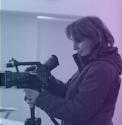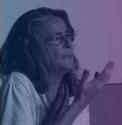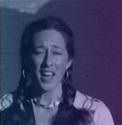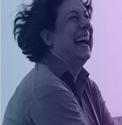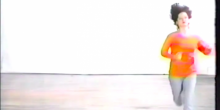
“Her” Chroma Noise: Feminist Performance Tapes from the Franklin Furnace Archive
“Her” Chroma Noise: Feminist Performance Tapes from the Franklin Furnace Archive
A collaboration between Wendy’s Subway and Franklin Furnace Archive, Inc.
Curated by Megan Toye
Opening reception and screening: April 10, 2018, 7pm
Wendy’s Subway Library
379 Bushwick Ave.
Brooklyn, NY 11206
Capacity: 30
RSVP here: https://goo.gl/forms/YcN1XCdpEvQaUH6v1
April 5-15, 2018: Book display at Wendy’s Subway, on view during library open hours. Video program available upon request.
Wendy’s Subway and Franklin Furnace Archive, Inc. are pleased to present “Her” Chroma Noise: Feminist Performance Tapes from the Franklin Furnace Archives. The program on April 10th features a screening of works by Carnival Knowledge, Susan Britton, Halona Hilbertz, Guerrilla Girls, Tracie Morris, Iris Rose, Anna Mosby Coleman, Johanna Went and Cassils. A selection of relevant books and periodicals from the Franklin Furnace Archive and Wendy’s Subway library will be on view from April 5th to April 15th. Readers are encouraged to visit the library during open hours to consult the titles at their leisure.
“The affective density of the works … may be understood as one way of working with noise, in which case affect appears as an interference, as a rupture in which the viewer is thrown back onto, into a disorientated self. That noise feels like the other side of art.”
—Jennifer Doyle, Hold It Against Me: Difficulty and Emotion in Contemporary Art
“Thinking of noise in terms of affect provides a framework that allows for noise’s capacity to diminish and destroy, as well as the enhance and create.”
—Marie Thompson, “Productive Parasites: Thinking of Noise as Affect”
Within the language of moving image preservation and assessment chroma noise is defined broadly as the fluctuation of color and luminance in the playback image. Considered a visual and technical anomaly, the presence of chroma noise indicates that the image has deviated from the “normal” or original way in which it was intended to appear. In “Her” Chroma Noise: Feminist Performance Tapes from the Franklin Furnace Archives, chroma noise appears literally as a visual anomaly in the video footage, but it also functions as a metaphor for the cultural impact of the tapes considered: here, feminist, queer and trans artists produce aesthetic noise to disrupt the dominant value-system of the art world and challenge patriarchal definition of gender. Chroma noise can be seen as the affective rupture that interferes and interrupts standards of aesthetic value and structures of normalcy; it is that which transforms the socially constructed image of “woman” and renders definitions of gender blurry and problematic. Most importantly, though, chroma noise is evident in the tapes at the Franklin Furnace Archive through the way in which each work transforms what is regarded as art by inserting and rendering visible the anomalous bodies that differently define and constitute it. Here, noise works to unsettle and destabilize patriarchal definitions of taste, creating through that moment of disorder a collection of counter-cultural artifacts that establish an alternative value system within the art historical canon.
About Franklin Furnace Archive Inc.
Franklin Furnace's mission is to present, preserve, interpret, proselytize and advocate on behalf of avant-garde art, especially forms that may be vulnerable due to institutional neglect, cultural bias, their ephemeral nature, or politically unpopular content. Franklin Furnace is dedicated to serving artists by providing both physical and virtual venues for the presentation of time-based art, including but not limited to artists' books and periodicals, installation art, performance art, and unforeseen contemporary avant-garde art forms; and to undertake other activities related to these purposes. Franklin Furnace is committed to serving emerging artists; to assuming an aggressive pedagogical stance with regard to the value of avant-garde art to life; and to fostering artists' zeal to broadcast ideas.
About Wendy’s Subway
Wendy’s Subway is a non-profit library and writing space located in Bushwick, Brooklyn. It provides an open, versatile space where cultural production flourishes through reading, research, and collaborative practice, and is manifested in performance, publication, and education. Wendy’s Subway hosts a range of public programs, including readings and screenings, interdisciplinary talks and lectures, discussion and reading groups, and writing workshops. The non-circulating library holds a collection of books and documents with a special focus on poetry, art, theory, and philosophy, as well as the Laurin Raiken Archive, an extensive resource for the study of art history and criticism. Wendy’s Subway is operated by its membership of poets, curators, novelists, artists, and critics with an interest in hybrid forms and cross-disciplinary discourse.
About the Curator
Megan Toye is a PhD candidate in Art History and Visual Culture at York University in Toronto, Canada. Megan specializes in the history of feminist conceptual art, and is currently writing on the Downtown New York scene in the late 70s. She has been published in Drain Magazine, the Journal of Curatorial Studies and Studies in Visual Arts and Communication: An International Journal. She has curated numerous exhibitions over the past 5 years in the Toronto area and has presented her research at multiple international conferences, including the Canadian Philosophical Association, the International Communication Association and the 10th annual Media Art Histories conference. She has been the recipient of numerous grants and awards, including the SSHRC Doctoral Fellowship, Max Stern Art History Award, Media@McGill Grant and the Ontario Graduate Scholarship.Program
Total run time: 1:21:56
Franklin Furnace Artist Book Discussion at Queens College: Martha Wilson in conversation with Matthew Hogan (excerpt), 1985, VHS (0:24:40 – 0:25:43)
Susan Britton, International Band, 1982, ¾ inch Umatic (0:08:28)
Carnival Knowledge, Deep Inside Porn Stars (excerpt) 1984, VHS (0:12:53 – 0:19:33)
Guerrilla Girls, Secret Identities, 1999, VHS (0:07:46)
Tracie Morris, Afrofem (excerpt), 1995, VHS (0:00:00 – 0:19:54)
Halona Hilbertz, Pseudo Studio Walk (excerpt) 1999, VHS (0:01:05- 0:05:25)
Iris Rose, Extreme Women, 1987, ¾ inch Umatic (0:08:38)
Johanna Went, Twin Travel Terror (excerpt) 1987, VHS (0:00:00- 0:12:39)
Anna Mosby Coleman, an non (excerpt), 1998, VHS (0:00:59)
Cassils, Hard Times (excerpt), digital, (2010) (0:03:41)
Program Descriptions (from the Franklin Furnace Event Catalogue)
Franklin Furnace Artist Book Discussion at Queens College: Martha Wilson in conversation with Matthew Hogan (excerpt), 1985, VHS (0:24:40 – 0:25:43)
Martha Wilson, founder of Franklin Furnace Archive Inc., discusses Franklin Furnaces’ collection of artists’ books, and the conceptual intention of the artist book form, with curator Matthew Hogan at Queens College on Thusday March 28th 1985.
Susan Britton, International Band, 1982, ¾ inch Umatic (0:08:28)
With all industrial and scientific symbolic images, the woman says that "science is succeeded in" and "science is security" as if she is applauding all those things. On the other hand, another woman indicates that "we are not a machine, we are a human being." The video ends with all busy images and woman who appeared earlier says that "we are too..." It implies that how we have come and where we are heading to, which gives us a great benefit, yet at the same time, bad side effects, too.
Carnival Knowledge, Deep Inside Porn Stars featuring Veronica Hart, Gloria Leonard, Sue Nero, Kelly Nichols, Candida Royalle, Annie Sprinkle and Veronica Vera (excerpt) 1984, VHS (0:12:53 – 0:19:33)
In the eighties, sexuality remains overvalued and repressed. We either see sex as an ultimate validation or fear it as a destructive force. Pornography as a mass market packaging or sexuality has become a focal point, even splitting the feminist movement into "anti-porn" and "pro-sex" groups. '"Anti-porn" feminists often find themselves unwitting comrades of the police and the "Moral Majority", while "pro-sex" feminists often find themselves associated with the porn industry. Why should we have to choose between the Pope and Playboy?
As feminists we find that pornography has given us room for pleasure, privacy, fantasy and freedom to explore sex where there might have been no other way. But we also recognize the demeaning effect porn has had on both women and men. Because it has been produced, defined and censored by a select few, pornography has led to a sexist, rather than sexual, representation of women and men. Through this show we seek to confront the distortions of pornography, and revitalize our erotic perceptions by creating our own "porn."
Guerrilla Girls, Secret Identities, 1999, VHS (0:07:46)
The anonymous group of feminist artists introduce their secret identities and give a brief description of their personas.
Tracie Morris, Afrofem (excerpt), 1995, VHS (0:00:00 – 0:19:54)
Afrofem is a musical, dramatic and poetic juxtaposition of two aesthetics: the Blaxploitation of the 1970's and the B-girl culture of today. Featuring Tracie Morris and a special, all female Afrofem jazz band and special guests.
Halona Hilbertz, Pseudo Studio Walk (excerpt) 1999, netcast transferred to VHS (0:01:05- 0:05:2500:36)
For the first season of Franklin Furnace's collaboration with Pseudo Programs, Halona Hilbertz presented Pseudo Studio Walk, a deceptively simple performance dealing with virtual and actual space. This 50 minute netcast consists of video documentation of her figure walking up to the camera, obscuring the lens with her bushy hair, then receding deep into Pseudo's loft, then up to the camera, and back, again and again. Using the actual of a venue reserved culturally for virtual spaces, the performance emphasizes different meanings of "space." It is a thing, an effort, an action that, unlike the usual information on the internet, cannot be reproduced. In this sense, it cannot be seen as an action representative of our information age - it is rather an action within a certain medium but also contrary to it. Ms Hilbertz' performances are influenced strongly by the audience's presence, this time the mode of transmission to the audience dominates.
Iris Rose, Extreme Women, 1987, ¾ inch Umatic (0:08:38)
In Extreme Women, Iris Rose examines the lives of three well-known women who represent extreme examples of the roles that women choose: Jayne Mansfield, the "Queen of Sex", a women whose celebrity was a product of her unusually endowed body and her willingness to exploit it; Ulrike Meinhof, founder of the German terrorist group "Red Army Faction" (popularly known as the Baader-Meinhof Group), whose intellect took her to extremes of political violence; and Mother Teresa, the Mother Superior who began a new order of Sisters in the slums of Calcutta, whose passionate interest in and understanding of suffering was her spiritual guide. Together these three women form a trinity of the physical, mental and spiritual aspects of the character. Rose presents their stories in a style that will be familiar to her Serial Killer Series, movement ranging from abstract descriptive and a pared-down, yet emotionally rich, narrative first and third person viewpoints.
Johanna Went, Twin Travel Terror (excerpt) 1987, VHS (0:00:00- 0:12:39)
Los Angeles punk circuit regular Johanna Went brings a raw and visceral performance to Franklin Furnace. A series of ten high-speed and elaborate costume changes transform Went from a world globe into a two-headed nun until, eventually, she appears wearing a cunt headdress while spewing white liquid from her mouth. Lucy Sexton and Anne Iobst from Dancenoise play the supporting roles of twin assistants to the debacle. The performance is punctuated with guttural screeches and super-sized taboo-shattering props like a giant turd and bloody tampon, which make for a grotesque, cathartic, and singular experience.
Anna Mosby Coleman, an non (excerpt), 1998, VHS (0:00:59)
In her live solo performance an non, Anna Mosby Coleman creates an environment exploring the use of water in conjunction with notions of gender identity and acts of service. As the performer in this context, she functions as an object, a screen, whereon a video projection will play. Simultaneous video projections will serve as environmental parameters. Coleman applies the interactive elements of water and air. an non evokes heaven in a bathroom, kitchen, or Laundromat.
Updated description from the artist: The signal interrupting the an non performance appeared, and was recorded, on the magnetic tape because a motorized professional still camera flash signal/advancing mechanism interrupted the video signal regularly. The camera (and cameraperson) was documenting the performance for organizational record, but this was not planned as part of the original intentioned performance, nor was it a glitch from the actual streaming. This performance was recorded in the days when a ringing cell phone, switched on silent, could cause Morris-code-like beeps if one was recording on tape, and someone forgot to turn their cell phone completely off. So these random signals, are not random, but they are indeed out of the control of the artist.
Cassils, Hard Times (excerpt), digital, (2010) (0:03:41)
Hard Times is a live performance informed by Los Angeles body building culture, Greek mythology and experimental film. This solo physical performance responds to the cultures of consumption and denial with an image of a body that sputters and twitches with exertion to maintain its manicured surface. Culturally and politically, we are in a state of rotting from the inside out and Cassils personifies this disintegration on six feet of scaffolding, wearing a prosthetic mask with the appearance that her eyes have been removed from their sockets. Accompanied by a soundtrack made by layering power currents, Hard Times will resonate within you long after you leave the gallery.
Artist Bios
Martha Wilson is an American feminist performance artist and the founding director of Franklin Furnace Archive art organization. Over the past four decades she has developed and created innovative photographic and video works that explore her female subjectivity through role-playing, costume transformation, and 'invasions' of other peoples personas. She is a recipient of two National Endowment for the Arts fellowships, a New York Foundation for the Arts fellowship, and an Obie Award and a Bessie Award for commitment to artists’ freedom of expression. She is represented by PPOW gallery in New York City.
Susan Britton was born in Winnipeg in 1952. She studied Advertising Art in Winnipeg and then transferred to Nova Scotia College of Art & Design (NSCAD), graduating with a BFA in 1976. She was active as video artist in the late seventies and eighties, exhibiting in Canada, the US and Europe. Susan opened the Cabana Room (with Robyn Wall) in Toronto in 1979. She moved to New York in 1982 and opened Machine Language with Wolfgang Staehle, Julie Harrison and Willoughby Sharp. Susan co-produced Willoughby Sharp’s Downtown NY 1986. Since then, Susan has mainly pursued unrelated interests since the mid-nineties, but she recently began work on a multi-channel video piece in Toronto, with the composer Eliot Britton.
Carnival Knowledge is an educational show about reproductive right issues, as well as a group of artists founded in 1981 as a direct response to the “Moral Majority.” Carnival Knowledge is organized by Jodie Fink, April Ford, Sue Frazier, Lupe Garnica, Ame Gilbert, Sabrina Jones, Beverly Naidus, Anne Pitrone, and Karen Ruch.
Guerrilla Girls is an anonymous group of feminist artists devoted to fighting sexism and racism within the art world. The group formed in New York City in 1985 with the mission of bringing gender and racial inequality into focus within the greater arts community. The group employs culture jamming in the form of posters, books, billboards, and public appearances to expose discrimination and corruption. To remain anonymous, members don gorilla masks and use pseudonyms that refer to deceased female artists.
Tracie Morris is an American poet, performer, vocalist, page-based writer, critic, scholar, bandleader, actor, and multimedia performer originally from Brooklyn, New York. Morris' sound poetics have long been progressive in allowing the poem to breathe off the page. She is currently a Professor, and Coordinator of Performance and the Performance Studies at Pratt Institute in Brooklyn, New York.
Halona Hilbertz was born in Austin, Texas to German parents. She moved to Munich, Germany at 8 years of age, and to Duesseldorf a few years later. Halona studied Painting and Performance Art at the Hochschule der Bildenden Kuenste Saar, Saarbruecken, Germany, and at the Nova Scotia College of Art and Design, Halifax, Canada. Halona makes objects. Her work has been included in various group and solo shows in Europe, the U.A.E. and New York. Halona co-founded Full Tank, an all-female experimental band with all original songs; her current band is Fetzig, also a DIY band. Bands have performed in NYC venues such as Trash Bar, Luna Lounge, Union Pool. She currently lives in Bed-Stuy, Brooklyn.
Iris Rose is a founding member of Watchface, a seven member performance group which has become a familiar presence on the downtown performance scene. Since Rose arrived in New York City, she has created, alone or in collaboration with other members of Watchface, 16 performance works including The Serial Killer Series, Of Little Women and Camden, an opera written with frequent Watchface collaborator Joshua Fried.
Johanna Went is an American performance artist who primarily works in the Los Angeles area. She started her career in the late 1970s as musician in the punk scene. Music is still an important element of her shows. She has often worked with musician Mark Wheaton, whose fast, rhythmic music beats provide the background noise in several of her performances. Further predominant elements of Went's shows are the use of elaborate costumes, which Went herself creates from various found objects, and the use of artificial blood. The latter played an especially important role in her early work. Went's performances are not strictly text-based. She typically works based on a sketch that determines the rough sequence of actions, but leaves much room for improvisation. Went rarely uses language in her shows as means of communication. She rather sings, screams, whines and murmurs, thus rendering large parts of the spoken words incomprehensible.
Anna Mosby Coleman is a concrete poet and interdisciplinary artist as well as the Creative Director for Philanthropic Chameleon in New York City. In addition to text works, she composes poems with film, video signal, installation, drawing, painting, photography, artist books, and hospitality often incorporating meals for participants in her works of social sculpture. A graduate of New York University with a Master of Fine Arts and Carnegie Mellon University with a Bachelor of Fine Arts; she has received prestigious grants from: The Pennsylvania Foundation for the Arts, The National Endowment for the Arts/American Film Institute Fellowship, and The Vira I. Heinz Foundation for Innovation in the Arts. Her video poems have been shown in festivals including ArcheTime, Hallwalls, and Uruguay’s Film & Video Poetry Festival. From 2006 to 2013, she founded and co-produced the intimate, artist community Cine Capellini Film Festival. Currently, Anna is consulting and producing for Dance Films Association's Dance on Camera Festival at Lincoln Center.
Cassils is a performance artist, body builder and personal trainer from Montreal, Quebec, Canada now based in Los Angeles, California, United States. Their work uses the body in a sculptural fashion, integrating feminism, body art, and gay male aesthetics. Cassils is the recipient of a Guggenheim Fellowship, a Creative Capital Grant, a United States Artists Fellowship, a California Community Foundation Visual Artist Fellowship (2012), several Canada Council for the Arts grants, and the Rema Hort Mann Foundation Visual Arts Fellowship. Cassils is gender non-conforming and transmasculine, and goes by singular they pronouns.
Reading List
Books and Journal from Laurin Raiken Archive:
Heresies: A Feminist Publication on Arts & Politics, Issue #1 (January 1977)
Heresies: A Feminist Publication on Arts & Politics, Issue #2 (May 1977)
The Feminist Art Journal, vol. 2 (Summer 1976)
Women Artists News, vol. 13, no. 3 (Fall 1988)
Art Papers, vol. 11, no. 5 (September/October 1987)
Performance Art I, vol. 1 (1979)
Lucy Lippard, Six Years: The Dematerialization of the Art Object from 1966 to 1972. Berkeley: University of California Press, 2007 [c.1973]
Lucy Lippard, From the Center: Feminist Essays on Women’s Art. New York: Dutton, 1976.
Renato Poggioli, The Theory of the Avant-Garde. Cambridge, MA: The Belknap Press of Harvard University Press, 1981.
Hal Foster, The Anti-Aesthetic: Essays on Postmodern Culture. New York: New Press, 1998.
Books from Wendy’s Subway Permanent Collection:
Griselda Pollock, Vision and Difference: Femininity, Feminism and Histories of Art. New York: Routledge, 2015 [c.1988].
Peggy Phelan, Unmarked: The Politics of Performance. London: Routledge, 2004 [c.1997].
Amelia Jones and Andrew Stephenson (ed.), Performing the Body/Performing the Text. London; New York: Routedge, 2005.
Jayne Wark, Radical Gestures: Feminism and Performance Art in North America. Montréal: McGill-Queens University Press, 2014.
Gabriella Giannachi, Jonah Westerman (eds.), Histories of Performance Documentation: Museum, Artistic, and Scholarly Practices. London: Routledge, Taylor & Francis Group, 2018.
Books from Franklin Furnace Archive, Inc. :
Lynda Hart and Peggy Phelan, eds. Acting Out: Feminist Performances. Ann Arbor: The University of Michigan Press, 1993.
Martha Wilson, ed. Martha Wilson Sourcebook: 40 years of reconsidering performance, feminism, alternative spaces. New York: Independent Curators International, 2011.
Toni Sant, Franklin Furnace and the Spirit of the Avant-Garde: A History of the Future. Bristol, UK; Chicago: Intellect, 2011.
Cynthia Carr, On Edge: Performance Art at the End of the Twentieth Century. Middletown: Wesleyan University Press, 2008.
Simon Taylor and Natalie Ng, Personal & Political: The Women’s Art Movement, 1969-1975. East Hampton, New York: Guild Hall Musuem, 2002.
Gunhild Borggreen and Rune Gade, eds. Performing Archives/ Archives of Performance. Copenhagen: Museum Tusculanum Press, 2013.
Art Journal, Vol. 56, no. 4 (Winter 1997)

